Review for Bunuel - The Essential Collection
It was great that ‘Belle De Jour’ got a complete 4K makeover recently and, following a limited run theatrical release, a really top-notch Blu-Ray release in the UK from StudioCanal. My review of that disc can be found here.
Perhaps even better news is the release of a brand-new Bunuel Blu-Ray box-set which includes a further six of his finest films, all in sparkling Blu-Ray and many offering some brand new extra features too.
I’m happy to report that the set represents a significant visual upgrade across the board when compared to the DVD Box-set (though excludes one film, ‘The Young One’ from that) and includes a whole raft of films from his later career including: Belle de Jour, Tristana, Diary of a Chambermaid, The Discreet Charm of the Bourgeoisie, Phantom of Liberty, The Milky Way and That Obscure Object of Desire (but no Viridana or, a personal favourite,
Belle De Jour : The 50th Anniversary Edition
(StudioCanal press release notes below and my review here)
Séverine (Catherine Deneuve, The Umbrellas of Cherbourg, Dancer in the Dark), the very reserved wife of Pierre (Jean Sorel, The Day of the Jackal), is prone to masochistic fantasies which reveal her sexual frustration. Driven by curiosity, she secretly pays a visit to a brothel and, unknown to her husband, soon becomes "Beauty of the Day", the third girl in Madame Anaïs' discreet house of ill-repute., having found an inner peace through the satisfaction of her clients' desires, things soon turn sour when Marcel (Michel Piccoli, Le Doulos), a loutish regular visitor to the bordello, insists on having Séverine all to himself. Panic-stricken, Séverine quits her dangerous day job but is it too late?
The Restoration: StudioCanal, in partnership with the CNC, the French Cinémathèque, the Franco-American Cultural Fund and the House of Yves Saint Laurent took the scan from the original negative and produced the 4K restoration of Belle . The work has been handled by the French laboratory, Hiventy.
Extra Features:
- Commentary by professor Peter W. Evans
- The Last Script
- A Story of Perversion or Emancipation? - Interview with Dr Sylvain Mimoun
- New Trailer
- New Jean-Claude Carrière interview
- New Masterclass with Diego Buñuel and Jean-Claude Carrière
Diary of a Chambermaid (aka Le Journal D'une Femme de Chambre)
In this black and white, 1964 adaptation of Octave Mirbeau’s novel of the same name, moody and charismatic beauty, Jeanne Moreau (Jules et Jim, Elevator to the Gallows) plays Céléstine, a beautiful Parisian chambermaid who, upon arrival at her new job at an estate in rural 1930s France, ingrains herself in a scandal with her philandering employer (Michel Piccoli, Le Doulos). Almost Hitchcockian in its twists and turns (with the rape and murder of a young child at its centrepiece) Diary of
a Chambermaid is a raw-edged tangle of fetishism and murder—and apparently scathing look at the burgeoning French fascism of the era. This was a third time watch for me and I enjoy the film more each time I see it; possibly this time as a result of it being HD. It just looks great. Although much of the film has an untypically straight-forward narrative for Bunuel, there are plenty of the auteur’s fingerprints throughout – not least the absurdity of the old man of the house’s obsession with boots, the cause of his eventual demise. Top stuff!
Extra Features include:
- An Angel in the Marshes documentary – a 30 minute video essay on the film using extracts, focusing on the intrinsic hypocrycies played out by characters throughout the film. In French with English subtitles.
- New Jean-Claude Carrière interview about the making of the film
- New Aesthetics of the Irrational: ICA Q&A with Jean-Claude Carrière hosted by Jonathan Romney
The Milky Way (aka La Voie Lactee)
Made in 1969, ‘The Milky Way is the first of what Buñuel later declared a trilogy (along with The Discreet Charm of the Bourgeoisie and The Phantom of Liberty) about “the search for truth”. On paper, The Milky Way sounds a lot less fun than it is. It follows the journey of two vagabond travellers (Paul Frankeur, The Discreet Charm of the Bourgeoisie and Laurent Terzieff, Détective) on a pilgrimage, not necessarily for religious reasons, but more as a means of escape. Along the way, the pair witness a series of bizarre incidents and, at key moments, encounter both Jesus and the Virgin Mary. The plot is non-linear and functions as a highly symbolic travelogue across time and space, set over the last two thousand years, encompassing much of Christian history that, while using satire to critique religion from a sceptical perspective, also attempts to extract verities out of the act of spiritual quest and search for meaning.
Extra Features include:
- Buñuel, atheist thanks to God documentary – a 30 minute documentary made in 2005 about Bunuel’s dalliances with religion, despite being a renowned atheist.
- Trailer
- New Jean-Claude Carrière interview
- New Critical Analysis by professor Peter W. Evans; an illuminating academic review by a professor from Queen Mary University of London
Tristana (1970)
Made in 1970, Tristana (Catherine Deneuve The Umbrellas of Cherbourg, Dancer in the Dark) is an orphan adopted by nobleman don Lope Garrido (Fernando Rey The French Connection). Don Lope falls in love with her and treats her as wife as well as daughter from the age of 19. But, by age 21 Tristana starts finding her voice and demands to study music, art and other subjects with which she wishes to become independent. She meets the young artist Horacio Díaz (Franco Nero Django), falls in love, and eventually leaves Toledo to live with him. When she falls ill with a tumour and loses a leg, Tristana has to return to don Lope.
Now older, he has taken to passing his days playing cards with the local priests, but Tristana is cruelly bent on revenge for the man’s past behaviour.
There is much of Bunuel’s trademark Freudian reference here and parts of the film have a surreal, dreamlike quality.
Extra features include:
- Rituals – A 20-minute documentary about the film
- Trailer
- New Interview with Franco Nero
The Discreet Charm of the Bourgeoise (aka Le Charme Discret de la Bourgeoisie)
Carriere and Bunuel scooped an Oscar for this humorous 1972 film about a decidedly middle class group whose attempt at to eat dinner together is continually disrupted by a series of increasingly surreal events. Thematically close to another Bunuel film from a decade earlier (and another favourite of mine). ‘The Exterminating Angel’ where the whole party of guests find themselves unable to leave a party, this surreal film soon descends into increasingly dreamlike vignettes. In fact, the film descends into Monty Python-like absurdities, like when they visit a colonel’s house and are served rubber chickens (David Lynch’s ‘Eraserhead’ anyone?) and then find the room’s curtains being raised to reveal them on a stage in front of an audience. All wild fun, though ultimately a bit aimless.
Extra features include:
- A Walk Among the Shadows – a 30-minute documentary
- Critical analysis by professor Peter W.Evans.
- Trailer
- New Jean-Claude Carrière interview
The Phantom of Liberty (aka Le Fantome de la Liberte)
This 1974 film seems a lot more serious in its analysis of the repressed middle-class than the very successful ‘The Discreet Charm of the Bourgeoise’. The structure is great fun with Bunuel releasing one red herring after another where we see people trapped in their own small worlds, despite believing themselves to be free. So we see a man interrupted at a medical check-up by a nurse wanting some time off. The film then follows the nurse without ever going back to the man in the room. From her we link to a series of evermore surreal vignettes which include religious and sexual enactments in common with the themes that seem to pre-occupy Bunuel who by now seems to be making films entirely for himself, ably aided and abetted by writer and collaborator, Jean Claude Carrière. The film is less humorous perhaps than ‘Discreet Charm’ but still an entertaining and though-provoking watch
Extra Features include:
- New Jean-Claude Carrière interview
- New Critical Analysis by professor Peter W. Evans
- Buñuel, la transgression des rêves: A new documentary by Pierre-Henri Gibert
- Photo Gallery
That Obscure Object of Desire (aka Cet Obscur Objet du Desir)
This 1977 film can be seen as a bookend on a career of surrealistic film-making. It has all the classic Bunuel ingredients and pre-occupations (sex, politics, religion etc). Mathieu (Fernando Rey dubbed into French by Michel Piccoli), is on a train ride from Seville to Paris and has been spotted pouring water over the head of a lady trying to get on the train. He explains to his indignant fellow travellers that he is beside himself with sexual frustration. In love with a flamenco dancer called Conchita, she refuses his advances despite him buying her gift after gift. Conchita is played by two actresses, Carole Bouquet as a tiny adolescent and Angela Molina as a sensual Latino dancer. They can (and do) change mid-scene, but this doesn’t phase Mathieu in the least. He really doesn’t notice. And as he tells his tale, his audience become more enraptured, passing comment and analysis. The anarchic ending somehow seems fitting as a sign-off from Bunuel, but I won’t spoil it here.
Extra Features include
- Interview with Carlos Saura
- The arbitrariness of desire by Jean-Claude Carrière
- Lady Doubles – interview with Carole Bouquet and Angela Molina
- Portrait of an impatient filmmaker, Luis Buñuel – Interview with Pierre Lady & Edmond Richard
- New Jean-Claude Carrière interview
- New Aesthetics of the Irrational: ICA Q&A with Jean-Claude Carrière & Diego Buñuel hosted by Tim Robey
Throughout the set, there is a noticeable lift in quality from the DVDs – which you would expect but which you don’t always get.
As a collection, this group of six films, most on Blu-Ray for the first time in the UK, forms a really great collection which really do reward repeated viewings Shipped with excellent contextual extras, the set is heartily recommended.
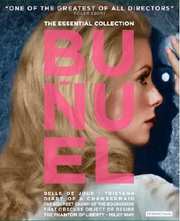

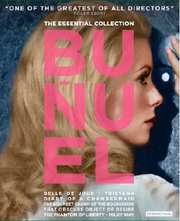

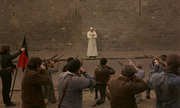


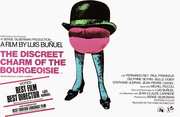
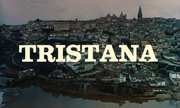

































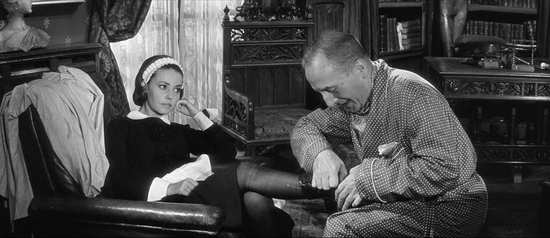


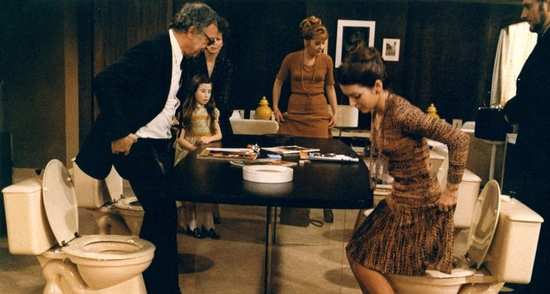

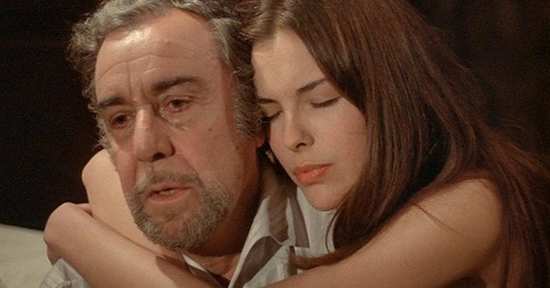
Your Opinions and Comments
Be the first to post a comment!